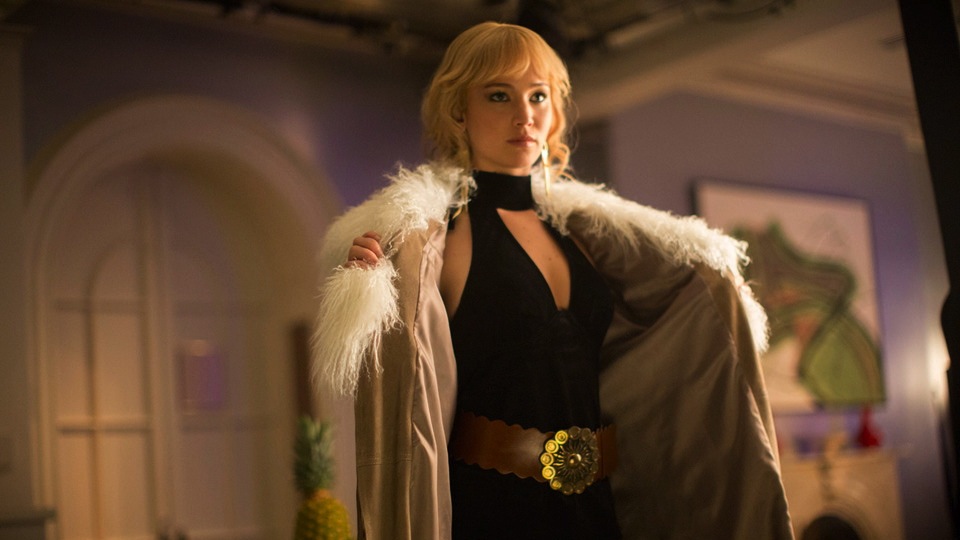"I don't want your future."

Fourteen years of mutant continuity and six films of varying quality later, original series director Bryan Singer has returned to retcon the reviled third Marvel Comics X-film, X-Men: The Last Stand, a film he never got to make, and right the X-Men ship for good. In X-Men: Days of Future Past, he and writer/producer Simon Kinberg (who co-wrote the aforementioned third film) use time travel, successfully aping the Terminator franchise, to re-establish the X-world both in the 1970s after the events of X-Men: First Class and the near future.
To this effect, the entire premise of the film, loosely adapted from the 1981 comic storyline of the same name, serves itself in the same way as the end of the first Superman movie as Kitty Pryde (Ellen Page) sends the ageless Wolverine back in time to 1973 to prevent their current dystopic future where giant evolving Sentinel robots kill humans and mutants alike. In this manner, DOFP acts as the Fast Five (aka Fast & Furious 5) of the film franchise with all its curious, strangely dense story and continuity by bringing old characters and introducing new ideas to merge every previous element introduced to date.
We've become fond of these mutant characters and their struggles with humanity witnessing them being forced to reset their paths and destinies. Singer remixes the best elements of previous films including his high water mark, X2: X-Men United, and the Matthew Vaughn (who co-wrote the story with Jane Goldman and Kinberg) directed swinging sixties set First Class. Set across multiple timelines back and forth like Inception, and two casts of characters, we see the future of mutant humanity unfold dramatically through historical fiction in a sort of superhero team-up crossover event akin to its source material.
The Sentinels set off a motion in history that threatens all mankind in the future. Hugh Jackman as Wolverine is back as our anchor and audience surrogate. He has the benefit and burden of knowing the future and past simultaneously as he folds into the background while setting the plot in motion. Patrick Stewart and Ian McKellan as the older Professor X and Magneto bring the full weight of their Shakespearean pedigree to make the most sense out of this comic book nonsense as exposition machines.

Once back in time, Wolverine meets up with Beast (Nicholas Hoult) and the younger Xavier (a dishevelled James McAvoy) to break Magneto out of jail with the help of Quicksilver (Evan Peters) in the highlight of the film, a sequence of pure delight using sped up and slow motion framing. It's everything comic book films should be on screen down to the every detail. Their mission is to stop the shapeshifting, blue-skinned Mystique (a transformed Jennifer Lawrence mirroring Fassbender's Nazi killer determination in First Class) from setting off the chain of events that lead to the future of Sentinel doom. Lawrence gives a particularly layered, captivating performance balancing villainy and sympathy well.
Franchise regulars Halle Berry and Shawn Ashmore join newcomers Omar Sy, Fan Bingbing, a slew of cameos, and a severely under-utilized Peter Dinklage (playing the Sentinels' creator and chief villain) to flesh out the universe amusingly. It's strange how the fourteen year history of X-Men films (never fully rebooted) guides us through the different eras and evolution of superhero and comic book genre filmmaking since it started the trend back in the year 2000. DOFP balances the tone and fun of the originals with the refreshing, nostalgic energy of First Class with younger versions of these characters. However, it depends heavily on your knowledge and familiarity of the previous X-Men stories.
Singer and Kinberg seem to care little about the multitude of plot holes or unanswered questions. Why is Professor X alive in the future after dying in The Last Stand? How did he and Magneto become partners in the future? Didn't Magneto lose his powers? What happened to all the other X-Men? How is Kitty, who can walk through walls, able to send people's consciousnesses back through time? Where were the Sentinels in the original films if they were created in the 1970s? Do you know why? Because comic books, that's why. It's kind of refreshing as it never lets up or explains too much. It assumes you know these characters and are game for to the ride that follows. DOFP doesn't hide how the film exists entirely to fix the wrongs of previous films and bridge the gap between the franchise semi-reboot prequel and the original films. And it surprisingly works well and rather sublimely.
At its core, the cast and its assembly make the film narratively coherent despite some ridiculous time travel and narrative logic. DOFP has a massive scope and ambition, largely succeeding in all of them by focusing on its complicated characters and lucid themes. It's strange yet exhilarating to see how Fassbender's Magneto works alongside Jackman and this excessive cast of all-star actors. Ultimately, it's the charismatic and dynamic performances that hold the X-universe together. Singer fully embraces the comic book style of cinematic storytelling, using narrative to drive forward this crossover event in order to deceptively explore character and theme. It's a remarkable achievement how it fits in and rewrites X-Men history on film. Mutant and proud.
More | YVArcade / Badass Digest / Forbes / The Dissolve / The Playlist






